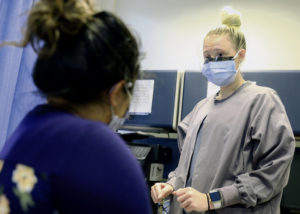
It’s been said that a crisis can be viewed from two aspects, that of danger and another for opportunity.
Over the past several months, COVID-19 has transformed business practices, social gatherings and patient care processes. While many of these changes are an expansion of technology to continue the lifestyles we are accustomed to, innovation has proven critical.
Only weeks after arriving at Landstuhl Regional Medical Center, and less than a year after enlisting in the U.S. Air Force, Airman 1st Class Tara Somers, a medical technician at LRMC’s Internal Medicine Clinic, found herself with the opportunity to help shape response efforts to COVID-19.
Somers, a native of Salisbury, Maryland, was handpicked from her peers to develop an Upper Respiratory Infection (URI) Clinic within the Internal Medicine Clinic patient population, some of which include high-risk patients.
“Somers has truly taken this task head-on and poured her heart into it,” said U.S. Air Force Tech. Sgt. Hilary Sellar, noncommissioned officer in charge, Internal Medicine Clinic. “She designed a 24-step algorithm for staff to use when patients call the clinic with an URI or COVID-19 symptoms.”
In addition to outlining how staff would respond to potential COVID-19 patients, Somers, 22, also authored a telephone script, how-to-guide, and initiated a patient tracker for use in the clinic. Somers’ innovative efforts also help differentiate patients with URIs, commonly referred to as the common cold, and potential COVID-19 patients.
“(The process) also provides more complete care to our patients and makes them feel like they are being prioritized when they are feeling afraid in the middle of the pandemic,” said Somers. “I am the only technician in the clinic specifically taking on the task. This allows me to follow providers more closely, obtain more knowledge and understanding about the pandemic and the medical threats it presents to our patient population.”
The algorithm specifies what staff members should do from first contact with patients, whether in person or telephone, through patient admission or disposition if necessary.
According to Sellar, as the main clinic touchpoint, Somers’ contributions don’t stop inside the clinic but also extend to ease their patient experiences through efforts such as contacting patients with test results, assisting with follow-up care and delivering prescriptions to patients in their vehicles to avoid unnecessary exposure.
“I love the fact that I am the ‘go-to’ for our clinic,” explains Somers. “When other providers, nurses, techs, or even patients have concerns, it feels good to know they have enough confidence in me to reach out for the answers and correct information or guidance.”
Although she is only beginning her military career, Somers’ ambition drives her to continue education toward a nursing degree, in hopes of increased responsibility and impact in patient care.
“Somers demonstrates knowledge, leadership and selfless service above her grade, and moreover, a true dedication to our patients and LRMC staff,” said Sellar.


